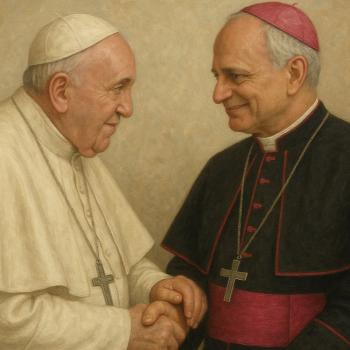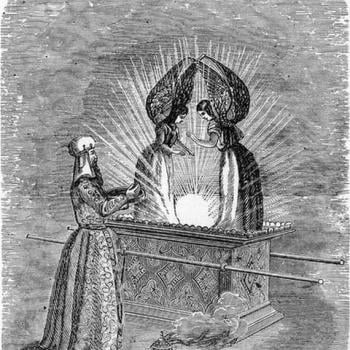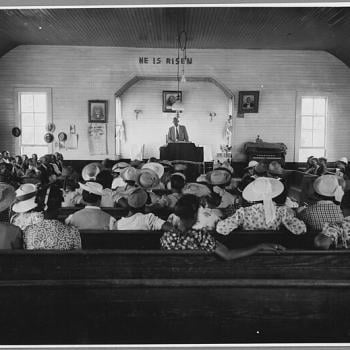Lectionary Reflections
Jeremiah 1:4-10
August 25, 2013
You and I will hear a great deal from the prophet Jeremiah over the next two months. The lectionary gives us eight weeks from his expansive book, with one week from Lamentations, a book closely associated with the prophet, sandwiched in the midst of the eight. For this abundance I am most grateful. I am often hard on the collectors of the lectionary for their, in my judgment, overly selective, or downright peculiar, criteria for their choices of biblical texts. But not with Jeremiah. We will see him in full prophetic flight as he castigates Israel for its evil actions. We will see him in the house of a potter, making prophetic hay out of the man's clay. We will see him confront another prophet, apparently well known, over the true implications of the upcoming Babylonian exile.
Perhaps most especially we will watch him weep over the very people he has spent months excoriating, and in that action we will come closer to the heart of what it actually means to be called of God. That fact, that deep insight into the prophetic life, is what makes Jeremiah such a special man and what gives his long book a special place in my own life. In Jeremiah I witness something of the rigors and joys and anguish of being called to ministry. Even more, I see in him the criteria by which I may embrace my prophetic calling. In short, in Jeremiah I must ask the question: what gives me the right to think that God has called me to ministry? How could anyone possibly tell if they are called by God or simply have made the whole thing up? Jeremiah is definitely worth two months of our inspection, and to that we now turn.
The book begins much like many of the prophets we have examined over the preceding weeks. We read first a chronological narrative, announcing roughly the time of the prophet's ministry. This list is this time quite specific: Jeremiah, we are told, received YHWH's word exactly in the thirteenth year of the reign of king Josiah who ruled over Judah from 640-609 B.C.E. Thus, Jeremiah began his prophetic career in 627 B.C.E. He spoke God's word, this note says, through the reign of Josiah's son, Jehoiakim, and right up until the exile of Israel to Babylon in the fifth month of 587 B.C.E., the eleventh year of the reign of the last king of Judah, Zedekiah.
These historical details are all very important as we assess the themes and the shifting passions of Jeremiah. Josiah was a reformer, having discovered in the walls of a rebuilding of the temple in Jerusalem a scroll, which most assume was something like the book we know as Deuteronomy. The year was 622 B.C.E. The authenticity of the scroll was determined by the prophet, Huldah, a female authority of the day. Josiah immediately began to put into practice the demands of the scroll that had been found. Most especially, the writing said that all true worship of YHWH must be now be conducted only in Jerusalem, necessitating the destruction of all outlying shrines, some of no doubt great antiquity and popular acclaim. In the succeeding thirteen years of Josiah's kingship reforms continued under the many legal demands found in the scroll, not the least of which were the Ten Commandments.
It is usually supposed that Jeremiah was in the main quiet during this long period, and was apparently in full agreement with the reforms undertaken. But in 609 B.C.E., in a foolish and deadly decision, Josiah leads a small army into battle against the pharaoh Neco, who himself is on his way to aid his Assyrian allies by engaging the Babylonian army at Carchemish far to the north of Judah. We can never know why Josiah made this fateful decision, but it cost him his life; he died at Megiddo. He was borne back to Jerusalem in his chariot, and the people mourned for many days (2 Kgs. 23:29-30). One of his sons, Jehoahaz, was made king but lasted only three months when he is captured by his Egyptian masters and imprisoned. The pharaoh then made Jehoahaz's brother, Jehoiakim, king, and his rule lasted eleven years until the Babylonians assumed control of the Middle East and made Zedekiah king over Judah.
With the accession of the kingship by Jehoiakim, the full fury of Jeremiah's prophetic language begins to sound in the land. No doubt, he was furious with Jehoiakim, who was little more than an Egyptian puppet, but there seems to have been more to his rage than that. The son was apparently nothing like the father, and Jeremiah on occasion becomes quite personal in his disdain for Jehoiakim. And his successor, Zedekiah, a Babylonian puppet, is little better. Thus, the bulk of Jeremiah's ministry occurs between 609 B.C.E. and 587 B.C.E. When Nebuchadnezzar destroys Jerusalem, Jeremiah, though he asks to remain with those left in the shattered city, is instead taken off to Egypt by some disciples and dies there. All that we read in the book needs to be heard in the light of this history of the end of Judah.





